By Leen Randell
Updated: Jul 04, 2024
10 Best Herbal Decoctions For Vomiting
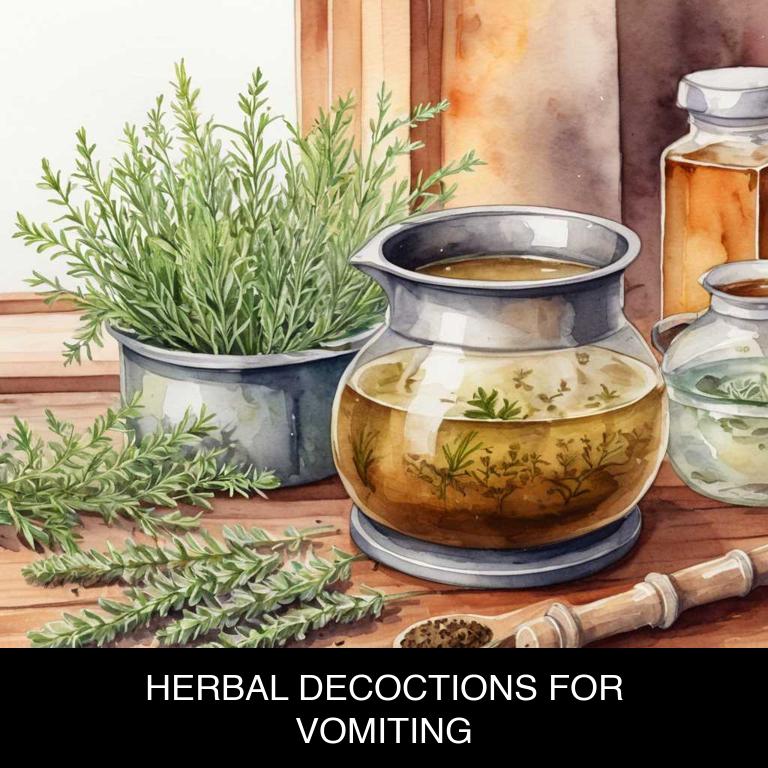
Herbal decoctions for vomiting are concentrated liquid extracts made by steeping herbs in water, which help alleviate nausea and vomiting caused by various conditions such as food poisoning, motion sickness, or chemotherapy.
These natural remedies work by soothing the digestive system, reducing inflammation, and calming the stomach. Examples of herbal decoctions that effectively treat vomiting include ginger, peppermint, and chamomile.
By using these decoctions, individuals can find relief from persistent nausea and discomfort, improving their overall quality of life and allowing them to resume daily activities with ease.
The following article describes in detail the most important decoctions for vomiting, including medicinal properties, parts of herbs to use, and recipes for preparations.
- 1. Glycyrrhiza glabra
- 2. Zingiber officinale
- 3. Peumus boldus
- 4. Taraxacum officinale
- 5. Mentha x piperita
- 6. Matricaria chamomilla
- 7. Foeniculum vulgare
- 8. Silybum marianum
- 9. Curcuma longa
- 10. Zanthoxylum americanum
- What is the best combination of herbal decoctions to use for vomiting?
- What ailments similar to vomiting are treated with herbal decoctions?
1. Glycyrrhiza glabra
Licorice decoctions helps with vomiting because it has natural anti-inflammatory properties that soothe the stomach lining, reducing inflammation and discomfort.
The decoction's sweet and warming nature can also help to calm digestive issues such as nausea and cramping, making it a gentle yet effective remedy for alleviating vomiting caused by stomach upset or motion sickness.
Additionally, licorice root has been shown to possess antispasmodic properties that help to relax the muscles in the stomach and intestines, further reducing symptoms of nausea and vomiting.

Medicinal Constituents
The list below shows the primary medicinal constituents in Glycyrrhiza glabra decoctions that help with vomiting.
- Glycyrrhizin: This triterpenoid saponin has anti-inflammatory properties and can help alleviate nausea and vomiting by reducing inflammation in the gastrointestinal tract.
- Liquiritin: This phenolic compound has anti-emetic and anti-inflammatory effects, which may contribute to its ability to reduce vomiting by modulating neurotransmitter activity in the brain.
- Licoricidin: This phenolic compound is known for its anti-inflammatory and antioxidant properties, which may help protect the gastrointestinal tract from damage and reduce nausea and vomiting.
Parts Used
The list below shows the primary parts of licorice used to make decoctions for vomiting.
- Roots: The roots of Glycyrrhiza glabra are widely used to make decoctions for vomiting due to their high content of glycyrrhizin, which has anti-inflammatory and anti-emetic properties.
- Rhyzomes: The rhyzomes of Glycyrrhiza glabra are also commonly used for decoctions related to vomiting, as they contain glycyrrhizin that helps in reducing inflammation and alleviating vomiting symptoms.
- Barks: The barks of Glycyrrhiza glabra are used to make decoctions for vomiting, as they contain glycyrrhizin that helps in soothing the digestive system and reducing vomiting.
Quick Recipe
The following recipe gives a procedure to make a basic licorice for vomiting.
- Gather 1-2 teaspoons of dried roots of glycyrrhiza glabra and store them in an airtight container.
- Combine the roots with 1 quart of water in a saucepan and bring to a boil.
- Reduce the heat to a simmer and let the mixture cook for 10-15 minutes.
- Strain the decoction through a cheesecloth or a fine-mesh sieve into a bowl.
- Allow the decoction to cool completely before transferring it to an airtight container for storage.
2. Zingiber officinale
Ginger decoctions helps with vomiting because of its natural anti-inflammatory properties, which soothe the stomach lining and reduce nausea.
The decoction's active compounds, such as gingerol and shogaol, also stimulate digestion and improve gut motility, helping to move food through the digestive system more efficiently.
Additionally, ginger has a direct effect on the brain's vomiting center, reducing its activity and alleviating symptoms of morning sickness, motion sickness, and other types of nausea-related vomiting.
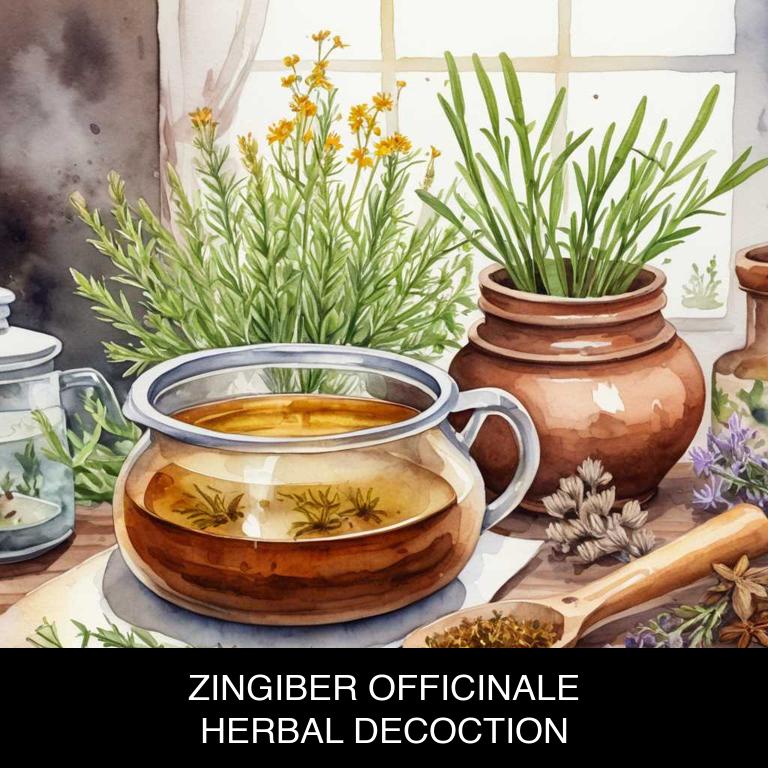
Medicinal Constituents
The list below shows the primary medicinal constituents in Zingiber officinale decoctions that help with vomiting.
- Gingerols: Gingerols, particularly 6-gingerol and 8-gingerol, have anti-inflammatory and anti-emetic properties that help alleviate nausea and vomiting by inhibiting the activity of serotonin receptors in the brain.
- Shogaols: Shogaols, such as 6-shogaol, have been found to have a similar anti-inflammatory and anti-emetic effect to gingerols, making them effective in reducing nausea and vomiting by blocking the action of serotonin receptors.
- Zingerone: Zingerone, a derivative of gingerols, has been shown to have a strong anti-inflammatory effect that may help alleviate vomiting by reducing inflammation in the digestive tract and promoting the relaxation of stomach muscles.
Parts Used
The list below shows the primary parts of ginger used to make decoctions for vomiting.
- Rhyzomes: The rhyzomes are used due to their high concentration of compounds with antiemetic and expectorant properties.
- Roots: The roots of Zingiber officinale are used for their ability to relieve nausea and vomiting, making them a common ingredient in traditional remedies.
- Buds: The buds are used due to their high content of volatile oils, which have been traditionally used to treat nausea and vomiting.
Quick Recipe
The following recipe gives a procedure to make a basic ginger for vomiting.
- Measure 500-1000 milliliters of water in a saucepan and bring it to a rolling boil for 5 minutes.
- Wash and peel 1-2 grams of fresh zingiber officinale rhizomes to remove any dirt or debris.
- Grate the peeled rhizomes into fine pieces to increase the surface area for infusion.
- Combine the grated zingiber officinale with the boiling water in the saucepan and reduce heat to a simmer.
- Allow the decoction to steep for 5-10 minutes to release the active compounds into the water.
3. Peumus boldus
Chilean boldo decoctions helps with vomiting because its leaves contain a unique combination of flavonoids, alkaloids, and terpenes that have natural anti-inflammatory and antispasmodic properties.
These compounds work together to relax the stomach muscles, reducing inflammation and spasms that can contribute to vomiting.
Additionally, Chilean boldo's natural expectorant properties help to soothe the digestive tract and alleviate nausea, providing relief from vomiting caused by various conditions such as gastritis, food poisoning, and motion sickness.
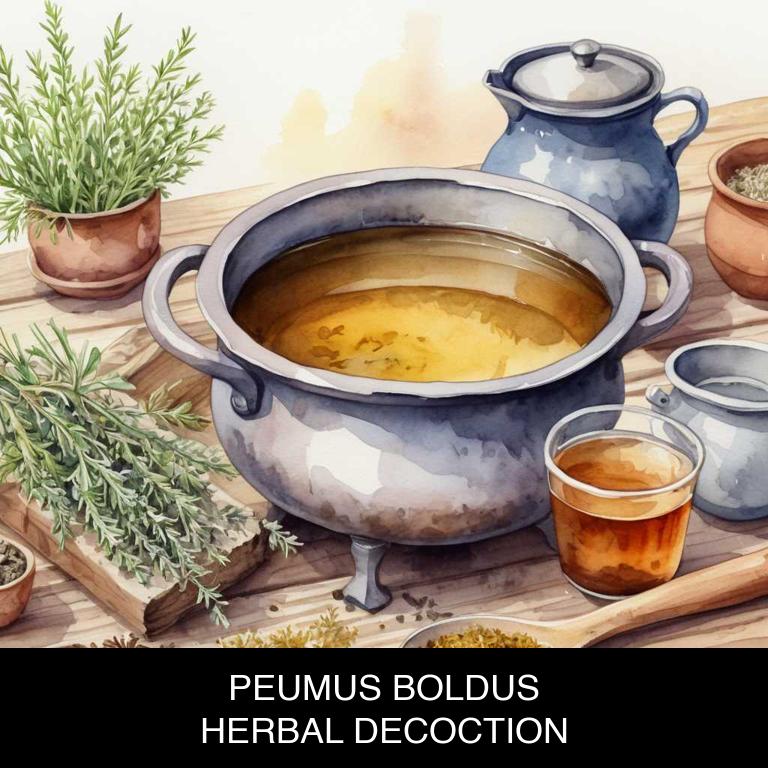
Medicinal Constituents
The list below shows the primary medicinal constituents in Peumus boldus decoctions that help with vomiting.
- Boldine: Boldine acts as an antiemetic by inhibiting the release of neurotransmitters involved in vomiting, such as acetylcholine, and by blocking the action of muscarinic receptors in the stomach and gut.
- Lignans: Lignans in Peumus boldus decoctions may help reduce vomiting by modulating the gut-brain axis, reducing inflammation, and exerting a potential anti-histamine effect, which can alleviate nausea and vomiting.
- Flavonoids: Flavonoids present in Peumus boldus decoctions may exhibit anti-inflammatory and antioxidant properties, which can help reduce inflammation in the stomach and gut, alleviate nausea, and decrease the incidence of vomiting.
Parts Used
The list below shows the primary parts of chilean boldo used to make decoctions for vomiting.
- Leaves: The leaves are the most commonly used part of Peumus boldus for decoctions due to their medicinal properties and ease of preparation.
- Barks: The barks are used in decoctions to stimulate vomiting and relieve other gastrointestinal issues.
- Roots: The roots are also used in decoctions to induce vomiting and treat various health conditions.
Quick Recipe
The following recipe gives a procedure to make a basic chilean boldo for vomiting.
- Gather 1-2 teaspoons of dried boldus leaves and store them in an airtight container for up to 6 months.
- Measure 1 cup of water and bring it to a boil in a medium saucepan on high heat for 5-7 minutes.
- Reduce the heat to low and add the dried boldus leaves to the boiling water for 10-15 minutes.
- Strain the decoction through a cheesecloth or a fine-mesh sieve into a clean glass container for 5 minutes.
- Discard the solids and store the cooled decoction in the refrigerator for up to 24 hours.
4. Taraxacum officinale
Dandelion decoctions helps with vomiting because it has a natural anti-inflammatory property that soothes the stomach lining, reducing inflammation and irritation.
The diuretic properties of dandelion also help to stimulate digestion, promoting the release of toxins from the digestive system and preventing their re-absorption into the bloodstream.
Additionally, the bitter compounds in dandelion root have been shown to stimulate appetite and improve digestion, helping to alleviate nausea and vomiting associated with indigestion and other gastrointestinal issues.

Medicinal Constituents
The list below shows the primary medicinal constituents in Taraxacum officinale decoctions that help with vomiting.
- Taraxasterol: It helps with vomiting by inhibiting gastric contractions and reducing inflammation in the stomach, thereby alleviating nausea and vomiting.
- Taraxasterol acetate: Similar to taraxasterol, it has anti-inflammatory and anti-spasmodic properties that help to calm the stomach and reduce the frequency and severity of vomiting.
- Phenolic acids: Specifically, caffeic acid and chlorogenic acid, which are present in Taraxacum officinale decoctions, have anti-inflammatory and antioxidant properties that help to reduce inflammation in the stomach and alleviate nausea and vomiting.
Parts Used
The list below shows the primary parts of dandelion used to make decoctions for vomiting.
- Roots: They are used due to their ability to stimulate digestion and induce vomiting.
- Leaves: They are used due to their diuretic and laxative properties, which can help induce vomiting.
- Seeds: They are used due to their emetic properties, which can help induce vomiting.
Quick Recipe
The following recipe gives a procedure to make a basic dandelion for vomiting.
- Harvest 1 to 2 bunches of taraxacum officinale roots in the early morning after the dew has dried.
- Wash the roots thoroughly under cold running water to remove dirt and debris.
- Chop the roots into small pieces weighing about 30 grams per 250 milliliters of water.
- Boil the chopped roots in 250 milliliters of water for 5 to 7 minutes to release their active compounds.
- Strain the decoction through a cheesecloth or a fine mesh to remove the root particles completely.
5. Mentha x piperita
Peppermint decoctions helps with vomiting because of its natural ability to relax the muscles in the digestive tract.
The menthol content in peppermint soothes the stomach lining, reducing inflammation and spasms that can contribute to nausea and vomiting. Additionally, peppermint's calming effects on the gut also help to slow down digestion, giving the body time to recover from an episode of vomiting and reducing the risk of dehydration.
This natural remedy has been used for centuries to alleviate symptoms of digestive distress.
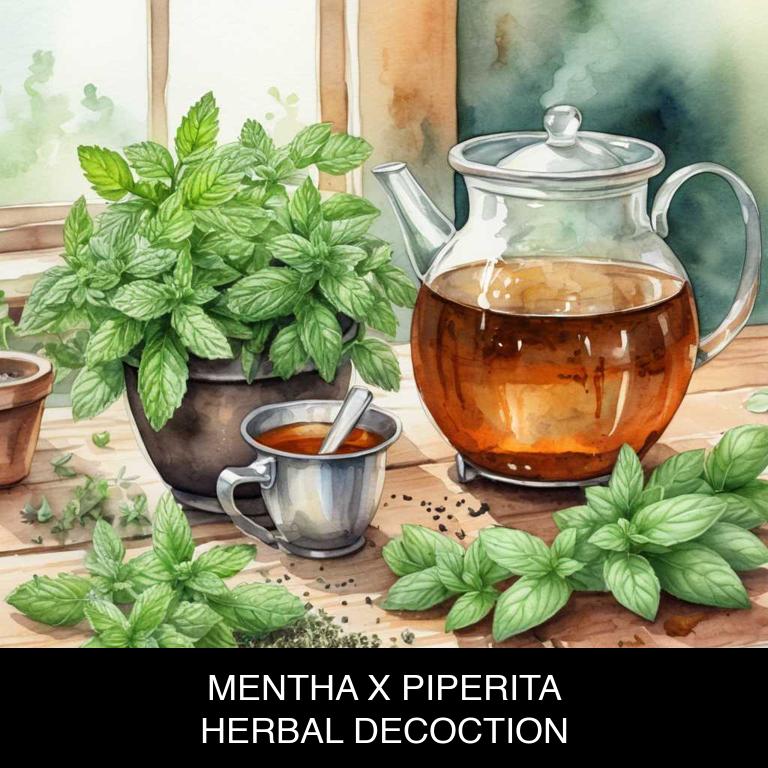
Medicinal Constituents
The list below shows the primary medicinal constituents in Mentha x piperita decoctions that help with vomiting.
- Menthol: Menthol, a terpene compound, helps to calm the stomach and reduce nausea by numbing the stomach lining and reducing inflammation, which in turn relieves vomiting.
- Limonene: Limonene, a terpene compound, has been shown to have anti-inflammatory properties and may help to reduce stomach spasms and alleviate nausea, contributing to the relief of vomiting.
- Rosmarinic acid: Rosmarinic acid, a phenolic compound, is an antioxidant that can help protect the stomach lining from inflammation and damage, reducing the likelihood of vomiting.
Parts Used
The list below shows the primary parts of peppermint used to make decoctions for vomiting.
- Leaves: They are used due to their high concentration of menthol and menthone, which have a stimulating effect on the digestive system and can induce vomiting.
- Roots: The roots of Mentha x piperita are used for their bitter and astringent properties, which can stimulate the stomach and induce vomiting.
- Stems: The stems are also used, particularly their fibrous parts, which can be used to make a decoction that has a similar effect to the leaves and roots.
Quick Recipe
The following recipe gives a procedure to make a basic peppermint for vomiting.
- Gather 1/4 cup of fresh menthaxpiperita leaves or 1 tablespoon of dried leaves to begin the decoction process.
- Combine the gathered menthaxpiperita leaves with 2 cups of boiling water in a saucepan.
- Reduce the heat to a simmer and let the mixture steep for 5 to 7 minutes.
- Strain the decoction through a cheesecloth or a fine-mesh sieve into a cup or container.
- Discard the solids and let the decoction cool to room temperature before consumption.
6. Matricaria chamomilla
Chamomile decoctions helps with vomiting because it has a soothing effect on the digestive system, calming inflammation and irritation that can cause stomach upset.
The anti-inflammatory properties of chamomile also help to reduce nausea and alleviate symptoms of motion sickness, making it an effective natural remedy for alleviating vomiting caused by travel or other conditions.
Additionally, chamomile's gentle sedative properties can help to calm the mind and body, further reducing feelings of anxiety and discomfort that can exacerbate vomiting.
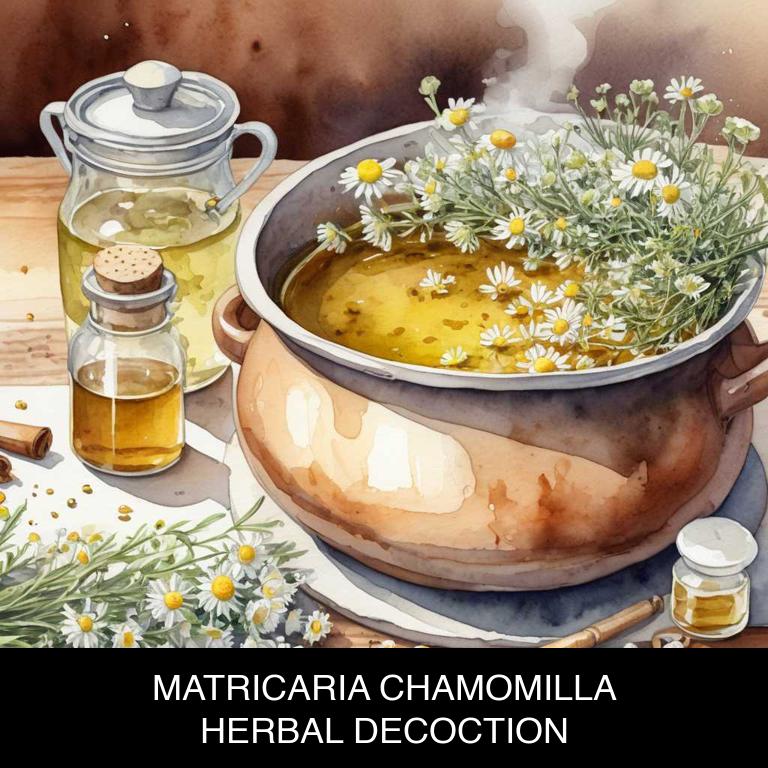
Medicinal Constituents
The list below shows the primary medicinal constituents in Matricaria chamomilla decoctions that help with vomiting.
- Apigenin: A flavonoid that helps alleviate nausea and vomiting by acting as an anxiolytic and anti-inflammatory agent, reducing the severity of gastrointestinal symptoms.
- Matricarin: A sesquiterpene lactone that exhibits anti-inflammatory properties, which can help in reducing inflammation and soothing the stomach lining to alleviate vomiting.
- Α-bisabolol: A sesquiterpene alcohol that has anti-inflammatory and soothing effects on the stomach, helping to calm nausea and vomiting by reducing irritation and discomfort.
Parts Used
The list below shows the primary parts of chamomile used to make decoctions for vomiting.
- Flowers: They are used due to their anti-inflammatory and antispasmodic properties that help soothe stomach issues and reduce vomiting.
- Leaves: They are used because they contain apigenin, a compound that has anti-inflammatory and antispasmodic effects, which can help alleviate vomiting.
- Seeds: They are used due to their carminative properties, which help relieve gas and reduce the likelihood of vomiting.
Quick Recipe
The following recipe gives a procedure to make a basic chamomile for vomiting.
- Gather 1 ounce of dried matricaria chamomilla flowers to use in the decoction.
- Measure out 1 quart of water and bring it to a boil in a large pot.
- Add the dried matricaria chamomilla flowers to the boiling water and steep for 10 minutes.
- Strain the decoction through a cheesecloth or a fine-mesh sieve to remove the solids.
- Bottle the filtered decoction and store it in the refrigerator for up to 3 days.
7. Foeniculum vulgare
Fennel decoctions helps with vomiting because its natural oils, such as anethole and limonene, possess anti-inflammatory and antispasmodic properties.
These compounds help to soothe and relax the digestive tract, reducing inflammation and cramping that can contribute to nausea and vomiting.
Additionally, fennel's sweet and calming flavor can also ease stomach discomfort, promoting a sense of relaxation and relief from symptoms associated with vomiting.
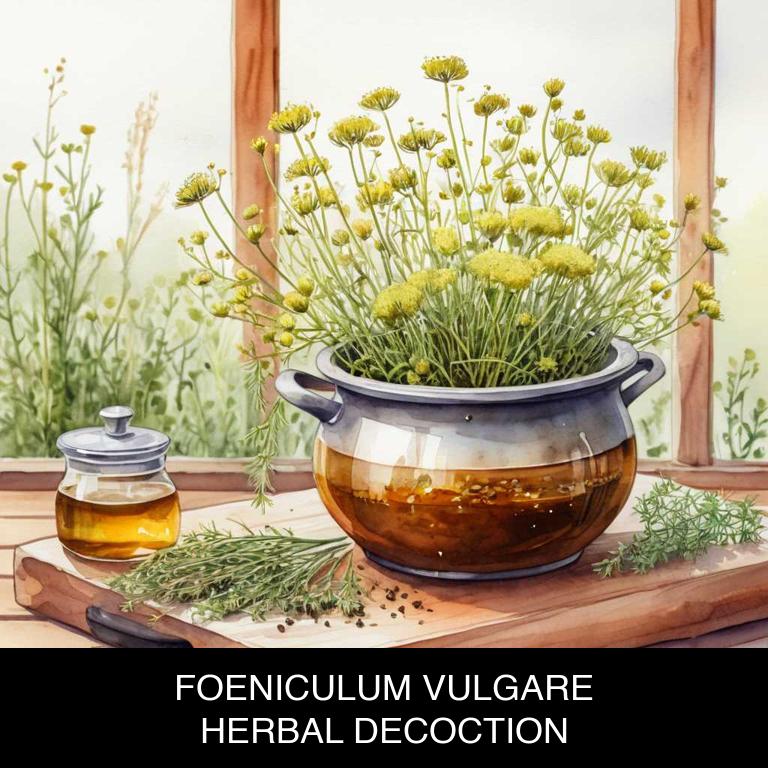
Medicinal Constituents
The list below shows the primary medicinal constituents in Foeniculum vulgare decoctions that help with vomiting.
- Sesquiterpene lactones: These compounds have anti-inflammatory and antispasmodic properties, which help to calm the stomach and reduce vomiting by inhibiting the contraction of smooth muscle in the gastrointestinal tract.
- Anethole: As a terpene and anethole is known for its carminative properties, which help to relieve gas and alleviate nausea, ultimately reducing the likelihood of vomiting.
- Phenolic acids: These compounds exhibit antioxidant and anti-inflammatory effects, which can help to soothe the stomach lining and reduce inflammation that may contribute to vomiting.
Parts Used
The list below shows the primary parts of fennel used to make decoctions for vomiting.
- Seeds: Used due to their carminative and antiemetic properties, which help to relax the stomach muscles and induce vomiting.
- Leaves: Used due to their bitter flavor, which stimulates the digestive system and helps to induce vomiting.
- Roots: Used due to their bitter and sweet flavors, which help to stimulate the digestive system and induce vomiting.
Quick Recipe
The following recipe gives a procedure to make a basic fennel for vomiting.
- Gather 2-3 teaspoons of dried foeniculum vulgare roots or seeds to create a decoction.
- Boil 1 cup of water in a saucepan over high heat for 5 minutes.
- Add the dried foeniculum vulgare roots or seeds to the boiling water for 10 minutes.
- Reduce heat to low and simmer the decoction for an additional 10 minutes.
- Strain the decoction and discard the solids to obtain a herbal remedy.
8. Silybum marianum
Milk thistle decoctions helps with vomiting because of its powerful liver-protecting properties.
The herb's active compound, silymarin, has been shown to reduce inflammation in the digestive tract and protect the liver from damage caused by toxins and oxidative stress. This can help alleviate symptoms of nausea and vomiting associated with liver dysfunction or poisoning.
By promoting liver health and reducing inflammation, milk thistle decoctions may help to calm the stomach and restore regular digestion patterns, providing relief from recurring bouts of vomiting.
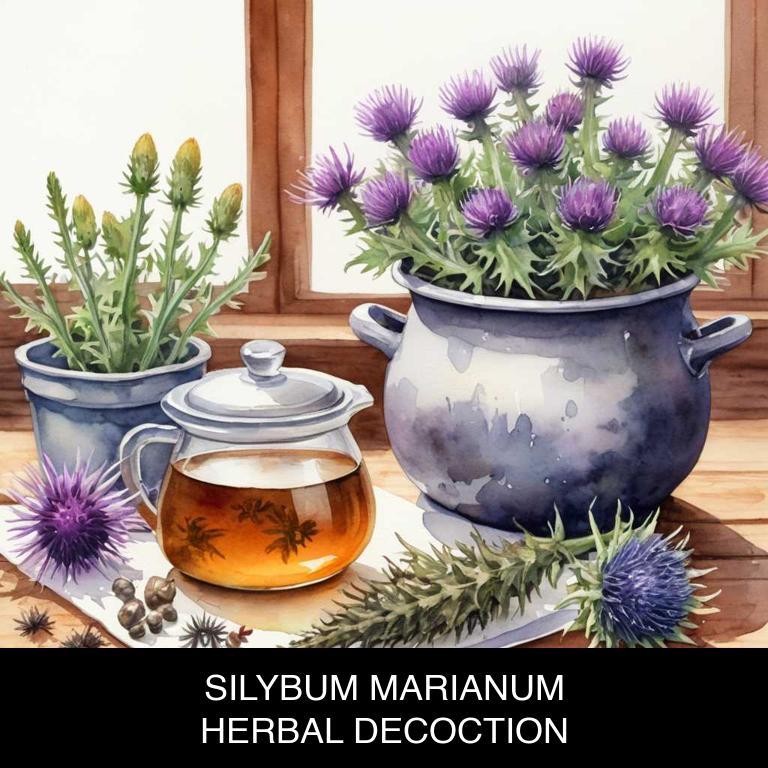
Medicinal Constituents
The list below shows the primary medicinal constituents in Silybum marianum decoctions that help with vomiting.
- Silymarin: Silymarin is a flavonoid complex that helps reduce inflammation in the gastrointestinal tract, alleviating vomiting caused by digestive issues.
- Lignans: Lignans have antioxidant properties that protect the stomach lining from damage, reducing the likelihood of vomiting triggered by stomach ulcers or inflammation.
- Flavonoids: These flavonoids have anti-inflammatory and antioxidant effects that help stabilize the stomach's acid-base balance, reducing the occurrence of vomiting associated with acid reflux or digestive disorders.
Parts Used
The list below shows the primary parts of milk thistle used to make decoctions for vomiting.
- Seeds: They are used due to their high concentration of cardenolides, which have emetic properties.
- Leaves: They are used due to their similar composition and potency to the seeds, although to a lesser extent.
Quick Recipe
The following recipe gives a procedure to make a basic milk thistle for vomiting.
- Harvest 20-30 grams of fresh silybum marianum leaves and flowers and wash them thoroughly under cold running water.
- Chop the plant material into small pieces and combine with 250ml of water in a saucepan.
- Bring the mixture to a boil over high heat then reduce the heat to a simmer for 5-10 minutes.
- Strain the decoction through a cheesecloth or a fine-mesh sieve into a clean container discarding the solids.
- Allow the decoction to cool and store it in the refrigerator for up to 24 hours.
9. Curcuma longa
Turmeric decoctions helps with vomiting because of its unique properties that soothe and calm the digestive system.
The active compound curcumin in turmeric has natural anti-inflammatory and antioxidant properties, which help to reduce inflammation and irritation in the stomach and intestines. This can help alleviate nausea and vomiting by reducing the spasms and cramps that often accompany these symptoms.
Additionally, the decoction's warm and soothing nature can also provide gentle relief from stomach discomfort and indigestion, making it a natural remedy for alleviating vomiting.
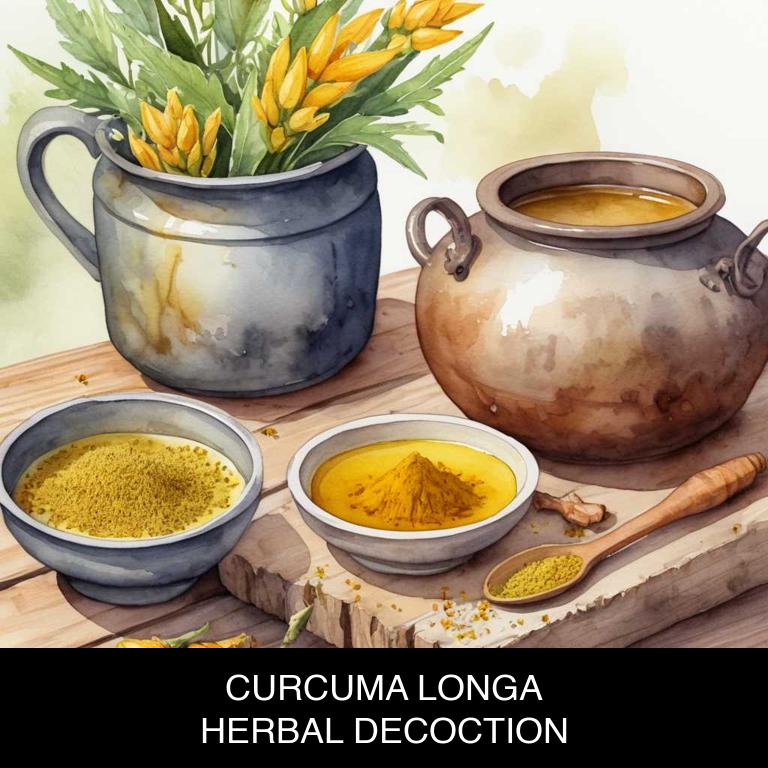
Medicinal Constituents
The list below shows the primary medicinal constituents in Curcuma longa decoctions that help with vomiting.
- Curcumin: It has anti-inflammatory and antioxidant properties, which help to reduce inflammation in the stomach and alleviate vomiting.
- Demethoxycurcumin: It has been shown to have anti-emetic properties, meaning it helps to prevent and reduce nausea and vomiting by inhibiting the action of neurotransmitters involved in the vomiting reflex.
- Bisdemethoxycurcumin: It has been found to have anti-inflammatory and anti-oxidative effects, which may help to reduce inflammation in the stomach and alleviate vomiting.
Parts Used
The list below shows the primary parts of turmeric used to make decoctions for vomiting.
- Roots: Employed for their ability to stimulate digestion and relieve nausea.
- Leaves: Utilized for their potential to calm the stomach and reduce vomiting.
Quick Recipe
The following recipe gives a procedure to make a basic turmeric for vomiting.
- Harvest fresh curcuma longa rhizomes for maximum potency and medicinal properties.
- Clean and peel the rhizomes thoroughly to remove any impurities or debris.
- Chop the rhizomes into small pieces to increase surface area and facilitate extraction.
- Steep one gram of the chopped rhizomes in 250 milliliters of boiling water for 10 minutes.
- Strain the decoction through a cheesecloth or fine mesh to remove the solids and achieve clarity.
10. Zanthoxylum americanum
Prairie toothpick decoctions helps with vomiting because it contains a unique blend of herbs that work synergistically to soothe the stomach and reduce nausea.
The combination of bitter roots, calming leaves, and aromatic bark helps to calm the digestive system and alleviate discomfort.
By reducing inflammation and spasms in the digestive tract, prairie toothpick decoctions can help to stop vomiting and restore a sense of balance and well-being.
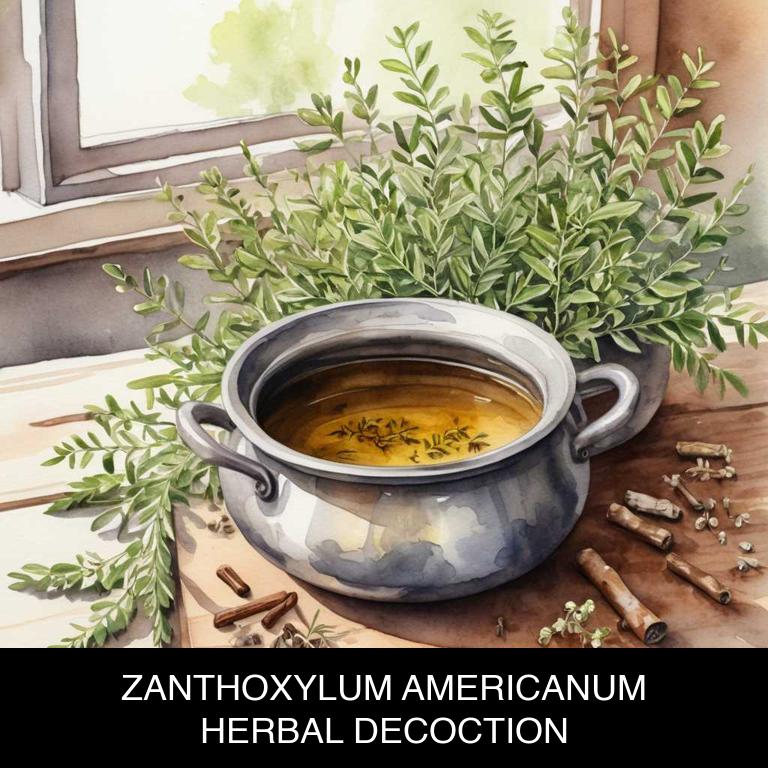
Medicinal Constituents
The list below shows the primary medicinal constituents in Zanthoxylum americanum decoctions that help with vomiting.
- Rotenoids: Rotenoids have anti-inflammatory and antispasmodic properties, which help in alleviating the nausea and cramping associated with vomiting.
- Flavonoids: Flavonoids in Zanthoxylum americanum decoctions have antioxidant and anti-inflammatory effects, which can help in reducing the severity and frequency of vomiting.
- Coumarins: Coumarins have been shown to have antispasmodic and anti-inflammatory properties, which can help in relaxing the muscles of the digestive tract and reducing the incidence of vomiting.
Parts Used
The list below shows the primary parts of prairie toothpick used to make decoctions for vomiting.
- Roots: Roots are used to make decoctions for vomiting due to their ability to stimulate digestive system and induce vomiting.
- Barks: Barks are used to make decoctions for vomiting as they contain compounds that help in relieving nausea and inducing vomiting.
- Leaves: Leaves are used to make decoctions for vomiting as they contain volatile oils that can help in stimulating the digestive system and inducing vomiting.
Quick Recipe
The following recipe gives a procedure to make a basic prairie toothpick for vomiting.
- Harvest zanthoxylum americanum roots and leaves for decoction preparation in late summer or early fall.
- Cut the roots into small pieces weighing approximately 100 grams and chop the leaves into smaller portions.
- Combine the chopped roots and leaves in a large pot with 4 cups of cold water and bring to a boil.
- Reduce heat to a simmer and let the mixture steep for 30 to 45 minutes to release active compounds.
- Strain the decoction through a cheesecloth into a separate container and discard the solids after filtering.
What is the best combination of herbal decoctions to use for vomiting?
The best combination of herbal decoctions that help with vomiting is a blend of Ginger, Peppermint, and Licorice root.
Ginger decoction has anti-inflammatory properties that help soothe the stomach, while Peppermint decoction relaxes the digestive system and reduces nausea. Licorice root decoction aids in digestion and protects the stomach lining from irritation. A balanced blend of these three decoctions, consumed in moderation, can help alleviate vomiting symptoms and promote overall digestive well-being.
Consult a healthcare professional before using any herbal remedy.
What ailments similar to vomiting are treated with herbal decoctions?
Ailments similar to vomiting/decoctions.html">vomiting/decoctions.html">vomiting that are treated with herbal decoctions are diarrhea, dysentery, and nausea.
Herbs like Triphala, Neem, and Ginger are commonly used in decoctions to alleviate symptoms of loose stools, abdominal pain, and stomach discomfort.
These herbs work by soothing the digestive tract, reducing inflammation, and improving gut health, thereby providing relief from gastrointestinal issues.